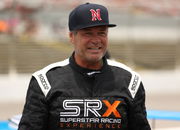
via Imago
NASCAR

via Imago
NASCAR
The 2025 NASCAR Cup Series season has started with high stakes, not just on the track but also in the courtroom. One of the sport’s biggest legal battles is unfolding as 23XI Racing and Front Row Motorsports (FRM) take on NASCAR. Notably, the teams claim the organization unfairly controls the sport’s charter system, limiting competition and financial opportunities for teams outside its inner circle.
23XI co-owner Denny Hamlin didn’t hold back when he addressed the ongoing legal battle. “We had to exercise our legal action to make it happen,” he stated, making it clear that the fight was necessary. While the court allowed both teams to continue competing, the lawsuit remains unresolved. However, this is not the first time that NASCAR has been sued by one of its top drivers. Back in 2007, Jeff Burton and his $188 billion sponsor sued NASCAR for limiting competition.
ADVERTISEMENT
Article continues below this ad
The lawsuit that shook NASCAR
Sponsorships have always driven NASCAR, with corporate logos covering race cars and driver suits. However, in 2007, a sponsorship battle escalated into a full-blown legal fight between NASCAR and telecommunications giant AT&T. The drama started when Jeff Burton’s primary sponsors, Cingular, were acquired by AT&T. The Telecom company had been backing Richard Childress Racing’s No.31 car since 2001.
However, in 2003, Sprint Nextel signed a 10-year deal to become the title sponsor of NASCAR’s top series, known as the Nextel Cup. As part of the agreement, NASCAR granted Nextel exclusive rights in the telecommunications category, effectively locking out competitors. However, the deal allowed Cingular and Alltel to continue under a grandfather clause. NASCAR allowed them to continue their sponsorship journey considering their pre-Nextel involvement in the sport.
Fast forward to 2007, Cingular was acquired by AT&T. The new telecom brand decided to rebrand its NASCAR sponsorship. While everything seemed straightforward, NASCAR blocked the move, citing its tie-up with Nextel. The Organizing body argued that Cingular was grandfathered, and AT&T couldn’t use it under their banner. AT&T took the matter to court in March 2007, arguing that NASCAR’s refusal to allow the rebrand was unfair. The case quickly escalated when U.S. District Judge Marvin Shoob granted a preliminary injunction in May 2007.
The time when NASCAR made Jeff Burton run a blank car. A thread 🧵: pic.twitter.com/9NO0upksf4
— FIVE WIDE Sports (@FiveWideSports) February 19, 2025
Despite the setback, NASCAR decided to fight back and filed a whopping $100 million lawsuit against AT&T. The sanctioning body accused the telecommunications company of breaching its contract, engaging in fraud, and interfering with its exclusive agreement with Nextel. They also sought the power to ban AT&T from its Cup series. While two giants were fighting in court, the biggest victims of the legal battle were Richard Childress Racing and Jeff Burton.
As the matter remained under legal prospects, Burton had to drive his No.31 RCR without any sponsor. He ran a blank car for almost half of the season. While Burton didn’t say anything about the ongoing legal battle, he greyed the Nextel logo from his racing suit. However, NASCAR and AT&T reached a compromise. In September 2007, the sanctioning body dropped its $100 million lawsuit as AT&T agreed to opt out after the 2008 season.
The settlement allowed AT&T to complete a transition period while preserving Nextel’s exclusivity from 2009 onward. “This agreement represents a compromise from all sides that ultimately serves the sport well. No one likes litigation, most of all the NASCAR fans, and it was time to find a mutually agreeable resolution,” said NASCAR Chairman and CEO Brian France.
The lawsuit was a landmark case that highlighted the power struggles between corporate sponsors and NASCAR’s governing body. It set a precedent for future sponsorship battles and reinforced NASCAR’s authority over its commercial agreements. However, this was only one of many legal battles which NASCAR has faced in the 21st century.
ADVERTISEMENT
Article continues below this ad
Trending
A century filled with allegations
Since the start of the 21st century, NASCAR has been part of various lawsuits. It all started in 2002 when Francis Ferko charged the league with an anti-trust lawsuit. Ferko, a shareholder in Speedway Motorsports Inc. (SMI), sued NASCAR and International Speedway Corporation (ISC) over race date allocations. He claimed that NASCAR’s refusal to grant Texas Motor Speedway a second Cup Series race violated antitrust laws. The lawsuit led to a settlement in which Rockingham Speedway was sold, and Texas gained a second race date.
Fast forward to 2009 when NASCAR faced its first doping case. In 2009, NASCAR suspended former Cup series driver Jeremy Mayfield after he failed two consecutive drug tests. Mayfield sued NASCAR for defamation and breach of contract, arguing that the drug test results were inaccurate. However, the courts ruled against him, stating that he had waived his right to sue when he signed NASCAR’s Driver/Owner Agreement. The case remains one of the most controversial in NASCAR history.
ADVERTISEMENT
Article continues below this ad
Finally, the latest addition to the legal fights is an ongoing antitrust lawsuit between NASCAR, Front Row Motorsports, and 23XI Racing. In 2024, the organizing body started negotiations for a new charter policy for the upcoming seasons. While all other teams signed the deal, Michael Jordan led 23XI Racing and FRM decided to take legal action. The teams claim that the new charter system is anti-competitive and limits their ability to operate fairly. They argue that NASCAR has too much control over team ownership, sponsorship revenue, and race participation. While courts allowed the team to continue with their current charters, the matter remains sub judice.
ADVERTISEMENT
ADVERTISEMENT
ADVERTISEMENT
ADVERTISEMENT






